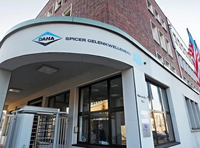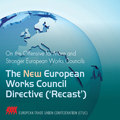Updating EWC agreements
 Around 40% of all existing European works councils were already established before EWC legislation came into force, in September 1996. They do not fall under the scope of the EU Directive. However, many of these " voluntary " EWC agreements do not come up to current standards, since they do not regulate satisfactorily major issues. It is therefore appropriate to adapt them to present day standards and hereby continue to improve the functioning of the European works council.
Around 40% of all existing European works councils were already established before EWC legislation came into force, in September 1996. They do not fall under the scope of the EU Directive. However, many of these " voluntary " EWC agreements do not come up to current standards, since they do not regulate satisfactorily major issues. It is therefore appropriate to adapt them to present day standards and hereby continue to improve the functioning of the European works council.
Adapting to the standards of the new EWC Directive
Prior to the adoption of the new Directive, numerous European works councils had already negotiated a new EWC agreement to improve their functioning. Many other European works councils were concretely confronted with this issue at the latest in June 2011, when the national legislation transposing the EWC Directive came into force.
It is not necessary to formally terminate the EWC agreement in all cases, since a written amendment is often sufficient. Notice for termination must be given however as a last resort, should the contracting parties not come to an agreement. For agreements which were concluded under article 6 of the EWC Directive, the subsidiary requirements of the respective national EWC legislation apply automatically when the contract comes to an end. On this basis, the European works council can continue to work without disruption.
Caution when terminating old agreements
The situation is different for "voluntary" agreements, which are not subject to EWC legislation. Giving notice for termination may lead to the dissolution of the EWC, in accordance with article 14 of the EU Directive, unless other regulations to the contrary have been stipulated in the agreement. A special negotiating body would then have to be established, which has a period of three years to negotiate a completely new EWC agreement. During this time there is no European works council in place.
- For a more detailed description of the legal background see: → The example of Hewlett-Packard
- Negotiations have already finished for the following: → HSBC and Wärtsilä
Adapting the EWC following mergers and acquisitions
For mergers, normally two existing European works councils are combined into one. In most cases a new EWC agreement is negotiated beforehand, integrating the improved information and consultation standards from the new EU Directive.
With old "voluntary" agreements the dissolution of the EWC can be avoided by using article 13 of the new EU Directive, if there have been fundamental changes in the structure of the company such as e.g. in mergers, acquisitions or spin-offs of larger divisions. In these cases a renegotiation of the EWC agreement can be forced. There are however no clearly defined criteria for when this is applicable. There have been no court rulings on the matter either.
Additional clauses may weaken the position for employees
British and American companies in particular, try to persuade their European works council to sign an appropriate clause aimed at avoiding this legal obligation. The central management frequently argues that the objective of these clauses is merely to avoid bureaucratic procedures, but their goal is in fact to weaken the quality of the EWC agreement. → Further information on these clauses
Our support as experts includes:
- Analysis of the EWC agreement compared with the new EU standards
- Advice on the legal consequences of giving termination notice
- Elaboration of draft texts for an improved EWC agreement
- Developing and evaluating different negotiation options
- Moderation of internal discussions, e.g. in the preparation for the merger of two EWC bodies
- Support during the negotiations with central management
Two examples of our work

Since January 2015, a new EWC agreement based on the standards of the new EU Directive applies for Dana, the US automotive group. The number of mandates in the EWC has almost been doubled. The select committee has been expanded from three to five members. The EWC founded in 2000 has its headquarters in Essen, Germany (photo), where it normally holds its annual meeting. In the future, a second plenary meeting may be held each year in another country. Central management has committed to inform the EWC in a timely manner so as to enable discussion and consultation influencing the decision making process. The consultation has the goal of "achieving a concerted solution as rapidly as possible."

In June 2019 an EWC agreement for Collins Aerospace was signed in Gdańsk. The two previous European works councils of UTC Aerospace Systems and Rockwell Collins are merged. Talks between the two councils had begun in Birmingham in October 2018 (picture). In February 2019, at a meeting at Toulouse Airport, details for the negotiations with central management were elaborated which then began in March 2019 in Brussels. The EWC members were advised throughout by the EWC Academy. The result represents a compromise between the two old EWC agreements. → further information
Further examples:
→ Vesuvius → Beiersdorf → Alliance Healthcare → Colt → ZF Friedrichshafen


